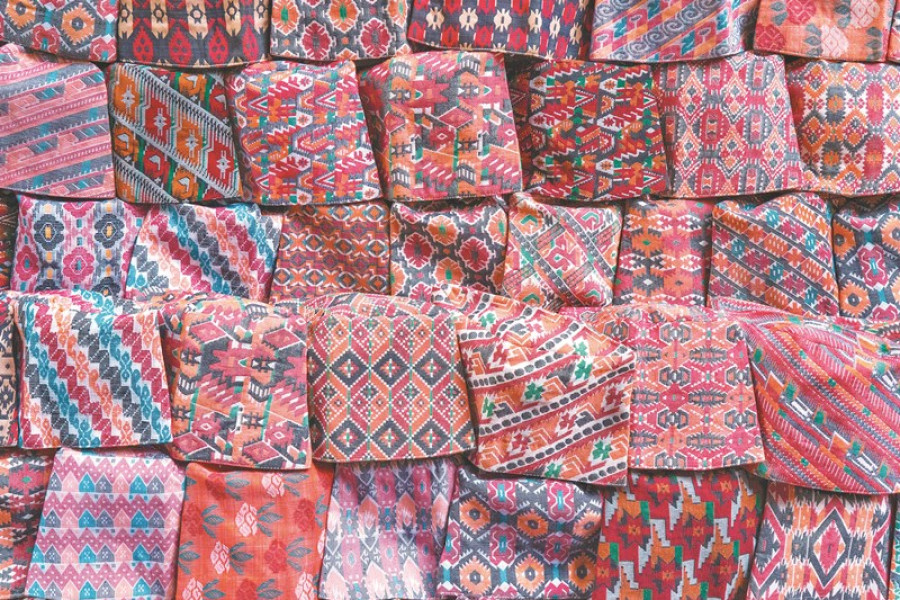Culture & Lifestyle
Sukmaya’s dhaka topi and shawl shop
A shrewd entrepreneur, Sukmaya single-handedly built her business only for her son to make it go bankrupt.
LB Thapa
Sukmaya ran a small garment shop in Palpa bazaar and sold all kinds of dhaka topis. Her shop was the oldest one in Palpa bazaar and she was much respected in the locality. Everyone fondly called her Suku didi. Sukmaya started running the shop with her husband, Chabilal, in 1970. But one day, Chhabilal disappeared and two days later his dead body was found in the nearby forest.
After losing her husband, Sukmaya was heartbroken. But with two children to raise, she couldn’t afford to spend a long time grieving. After a week of mourning, she got back to running her shop.
Sukmaya was not only a hardworking woman but was also a shrewd entrepreneur. A few years after her husband’s death, she expanded her shop and established ten handlooms to produce dhaka topis and shawls. When her locally produced dhaka topis and shawls saw unprecedented demand, she stopped importing dhaka topis from Kathmandu.
By working hard, Sukmaya single-handedly raised her two children. At that time, her son, Birendra, was in his final year of college. Her daughter, Tilicha, was a second-year PCL Nursing student. Both of them were studying in Palpa. Even though Sukmaya never got an opportunity to go to school she was determined to provide the best possible education to her children.
Immediately after completing her nursing course in Palpa, Tilicha started applying for a student visa in Australia. Tilicha’s happiness knew no bounds when her visa got approved.
Sukmaya drew a sigh of relief when she received a phone call from Tilicha saying she had landed safely in Australia and was on her way to her college-allocated room.
Unlike Tilicha, Birendra, after completing his Bachelor’s degree, did not show any interest in pursuing further studies. Instead, he wanted to start his own business.
One day, Birendra suggested his mother replace the handlooms with new machines that can produce all kinds of modern garments. However, his mother declined. “These handlooms are too slow. They are too time- and energy-consuming. We need to move on with time, or else we will be left behind and our business will suffer. We need to upgrade our business, mother,” advised Birendra anxiously.
“I have been doing well all these years with these ten handlooms and I still have more than enough work in my hand. I’m struggling to meet the local demand for dhaka topis and shawls. In a situation like this, we don’t need to replace handlooms with modern machines,” said a confident Sukmaya.
However, Birendra didn’t like those traditional handlooms. He wanted to get rid of them and import modern machines from China. Sukmaya tried her best to convince him to drop the idea of purchasing new machines but Birendra remained adamant. When Sukmaya did not agree with her son, Birendra, in protest, left home and began living in Kathmandu.
Birendra’s leaving home deeply bothered Sukmaya. Out of desperation, she made a phone call to Tilicha and explained what her brother wanted. Upon hearing everything, Tilicha said, “I don’t think my brother will be successful even if he goes ahead and starts his own business. He is the Mungerilal of Nepal. Ask him to complete his master’s degree and find a job in a college in Palpa. This is what he should do instead. I will not be happy if you ever allow him to do what he wants.”
For three consecutive nights, Sukmaya could not sleep. She didn’t like that there was nobody else she could seek advice from.
After much contemplation, Sukmaya finally made a decision. “All that I have earned is for my children. What they do with the property is their choice. At a time when I need my son’s support, he has decided to live far from me,” said Sukmaya to herself as she made up her mind to call her son back to Palpa.
Birendra was filled with excitement when his mother told him that he can replace the handlooms with machines. He wasted no time and caught the first bus to Palpa. Sukmaya was simply happy to see her son at home.
“I have put my heart and soul together to establish this small business. Now it is your responsibility to run it successfully. But, son, you should always be very careful while making financial decisions. Because it takes enormous time to develop a business, but it takes no time to bring it down,” advised Sukmaya to her son.
“Don’t worry, aama. You should come out of such an old mentality. Times have changed. I will show the people how to run a modern business,” said Birendra, with an inflated self-confidence.
Birendra went to the bank and applied for a hefty loan. Because the amount of the loan was huge, the bank manager told him that he needs to furnish more collateral. Birendra then submitted the papers of the family’s house and the plot of land, which was located at the heart of Palpa bazaar. Birendra didn’t tell her mother that he had mortgaged the house and the land because he knew that his mother wouldn’t approve of it.
Once the loan was approved, Birendra hired some labourers and dismantled all the handlooms and stored them in his house. When Sukmaya saw her handlooms being dismantled, her eyes welled up with tears. He had a giant galvanised shed constructed and installed the Chinese machines there.
A few months after construction began, the factory was up and running. All the machines worked smoothly and produced a variety of garments. For the first few months, Birendra business was good. Traders from all over Palpa and neighbouring towns came to place orders. But soon, Birendra started facing problems. Traders who had taken clothes from him were not paying back his money on time. When asked to pay the old dues, the retailers asked Birendra to take his clothes back complaining that the quality of the clothes was poor and people weren’t buying them. When most of the retailers gave him the same reply, he reduced the prices of his garments. Despite the heavy reduction in the prices, no retailers came forward to place orders from him. This started worrying Birendra. With no cash coming in, he soon started having problems paying bank instalments on time.
After failing to pay the bank for three consecutive months, the bank manager started telephoning Birdenra to pay what the bank owed him. In the fifth month, the manager came to the factory and warned Birendra that he should pay up or face consequences.
“If you do not pay your due instalments in a week, we will have no option but to seize your house and land,” warned the manager.
A day before the bank’s deadline, Birendra told his mother that he was going to Kathmandu for some work and that he would return in a week. While Birendra was away, the bank manager came to his factory looking for him. When he could not find Birendra, he went to his home and met Sukmaya. She was shocked when she found that her son had mortgaged the family’s house and land. She tried to contact Birendra several times but to no avail.
A few days later, the bank seized her house and the land. With no place to live, Sukmaya was forced to take shelter in one of her relative’s houses. She felt as if the ground beneath her feet had slipped away. At the age of seventy, Sukmaya was homeless. Though she was old and had no money, she was still determined to not be a burden on anyone. She started living in a makeshift shack and sold all her jewellery and restarted her business.
If you go to Palpa bazaar today, you can find Sukmaya at the end of the main market. She sells dhaka topis and shawls under a huge tree.




 11.54°C Kathmandu
11.54°C Kathmandu















